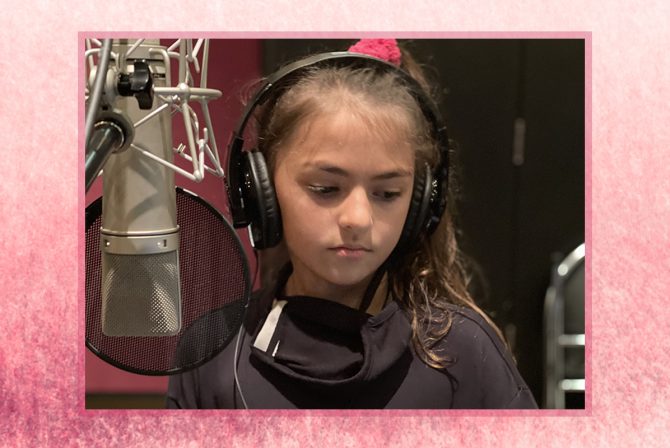我在一个装满的房子里长大with food。As an adult, I recognize this for the incredible blessing that it was: I’d have to play Tetris in order to find space for another Tupperware in the refrigerator, or sort through different loaves of bread in the pantry in order to find my favorite. I knew we were a Skippy peanut butter house — never Jif — and not until high school did I even consider that some families bought their peanut butter based on price or coupons, not their loyalty to their dad’s college nickname.
与我们的厨房一样多的食物,我听到食物作为孩子的故事从未相匹配过储存我们的货架的赏金。我这两个人parentswere frequent dieters, starting and stopping based on one trend or another. I didn’t always know the names of the饮食他们尝试了(虽然我记得饮食书游行,通常是微笑,瘦,白人在封面上拿着蔬菜),但我清楚地记得低压产品的不断存在,从重量观察者 - 品牌面包卷到瘦的面包牛冰淇淋三明治。
这些饮食从来不会持续太久,但permeate the energy of our kitchen enough that I often wondered what was wrong with the food we were eating — and the bodies we were using to eat them. Why did my parents have to eat special food that promised to help them become smaller, look different, weigh less? And why was all of this considered “good”?
我并不孤单。儿童保育专业人士报告孩子们有3名表达对他们的体重及其体重的焦虑。根据a 2016 study大约20%的被调查的儿童保育专业人员报告了听力子女拒绝食物“因为它将使它们脂肪”,“近一半(47%)报告在6至10岁的人中目睹身体形象焦虑。根据这一点Common Sense Media Reporton children, teens, body image, and media, one in four kids has begun showing some kind of dieting behavior by age 7, and more than half of girls and one-third of boys as young as ages 6 to 8 say their ideal weight is to be thinner than they are.
I think about this every year as we approach the holiday ofShavuot,犹太庆祝活动通常被家在家里被忽视,因为它的遵守是如此植根于社区仪式,如“Tikkun.,“夜间托拉研究的传统。生活在我们家中的鲥鱼传统,就像许多其他犹太节假日一样,以食物为中心。Shavuot有时(爱情!)叫做乳制品假期,以及我们吃的食物庆祝这一悲观的托拉,是丰富和颓废 - 一种承认Torah的丰富性的方式。奶酪是为a的Shavuot选择的庆祝食品number of reasons- rabpinic,文化,kabbalistic,你选择 - 但无论是什么起源,我们都有美味的借口来花一天创造一个基于奶酪的菜单庆祝盘子。
And yet, as delicious as these foods taste on the tongue, for so many of us, the voices of diet culture and fat-shaming creep into our heads, even when we’re actively trying to infuse our food with love, celebration, and Jewish tradition. They ask:Do you need that piece芝士蛋糕? Or:你刚刚做出了一个挑战的漂亮的布莱。这不够吗?Or:我不敢相信你有另一个闪亮 - 你是所以bad!
As a fat,非父母, I’m constantly aware of my body. I think about how much space I’m taking up, how feminine I look, how people are perceiving me. When I got pregnant, I spent a considerable amount of time in therapy talking about the story the world had told meabout bodies喜欢我的:他们的价值低于“健康”重量的“健康”人。我收到的消息是我们对健康资源的流失;我们难看;我们必须在道德上弱,因为,否则,为什么我们会胖?
What I wanted in these therapy sessions was to talk about how to take everything I’d internalized — and then worked for so many years to un-internalize — and仍然deal with the “thin is better” messaging I saw everywhere from sponsored Instagram ads to my parents’ new obsession with intermittent fasting. What’s more, as a parent of a 16-month-old child, I wanted to figure out how to raise a kid who惯于在10岁时(或更早)的重量。
到目前为止,我们的解决方案一直在谈论食物食物。Food is nourishment和能量;它的味道和纹理和颜色。这不是必须赚取的东西;它不是可以分类为固有的“好”或“坏”的东西。一些食物,如水果和蔬菜和花生酱和奶酪,给我们的身体能量。一些食物,像杯形蛋糕一样, make our taste buds jump in excitement and fill us with feelings like happiness and pleasure. The only “bad” foods are foods that aren’t safe to eat anymore — anything else is just differently important at different times.
这方面也有犹太智慧。我们来自丰富的食物传统,而不仅仅是在吃饭中(虽然有吃东西, too!), but in the way Judaism teaches us to interact with food, to acknowledge it, to express gratitude, to give thanks for its nourishment, for the acts of divinity and humanity that turned seed into grain, grain into flour, flour into pasta, pasta into dinner. As Naomi Ross explains in犹太行动:“哈希姆创造了我们准备不仅仅是卡路里的食物。他使它变得美味,是一种快乐和舒适的源泉。他没有这样做是为了让我们成为失败的失败,而是为了一个欣赏和享受给我们的所有细微差别的机会,也是为了让哈希姆作为这种祝福的遗嘱。“
那么,食物不仅仅是“值得一卡路里”。这是关于滋养我们的每一部分:our bodies, whatever their shapes; our minds, to teach them to recognize the delight in the experience of eating; our souls, to fill them with the pleasure of good tastes and the formation of happy memories.
So as I plan for Shavuot this year, the first year that my son will be old enough to join me in the kitchen and watch milk and cheese and flour and fruit and sugar and eggs become quiche and cheesecake and… sure,challah-baked brie, why not? — I’m thinking of the stories I want to tell him. Why these foods, on this day?
On Saturday mornings, we often sing Dan Nichols’ “Sweet as Honey,“参考诗篇19.:“耶和华的常见是......比蜂蜜更甜,”以及犹太文本的频繁参考,到牛奶和蜂蜜之间的联系,滋养和甜味。我想到了milk I fed him一年,从我的脂肪,奇怪,过度策划的身体;the way my body, to him — just as my mother’s was and still is to me — not something to be shrunk or changed, but a safe place to land: arms to hold, a soft chest to lay my head upon, and a squishy lap and tummy for snuggling. None of us are born ashamed of our bodies, and all I can hope to do with my son is hope he doesn’t learn shame from me.
So, this year, we’ll begin our first familyShavuot传统。我们将一起烹饪美味的食物,谈谈它滋养了我们的身体和灵魂的方式。我们将谈论Torah的礼物,如何滋养它是让我们的犹太智慧和学习将我们联系到我们历史的传统。我们会开始传统 - 我希望!- 将Shavuot连接到丰富的食物和甜味的回忆,而不是一丝羞耻,在牛奶和蜂蜜的故事中接地。
Header image by Arx0nt/Getty Images








